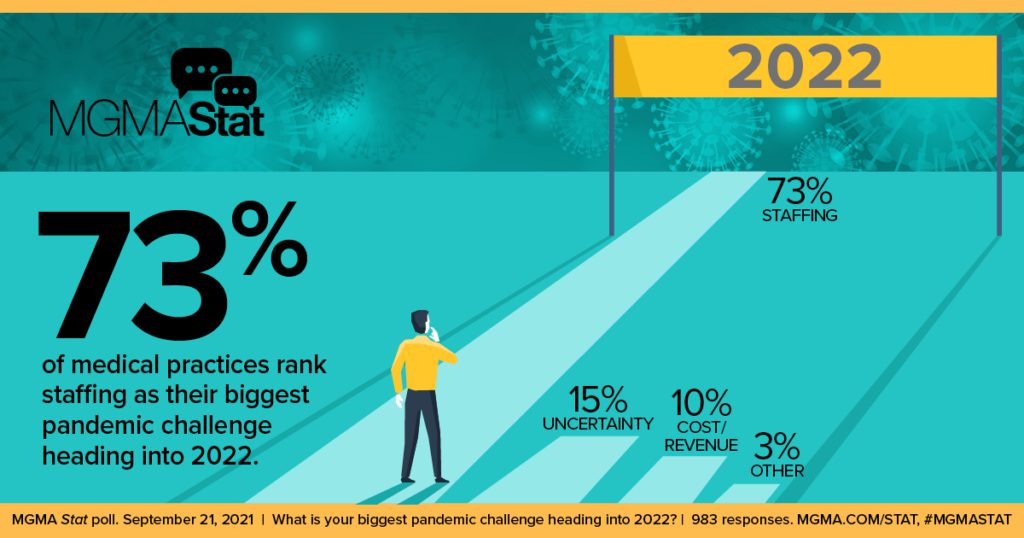Staffing issues have challenged allergy practices during the past year, and they continue to top the list of concerns for medical practices as they approach 2022. According to a recent MGMA Stat poll, close to three in four medical practices rank staffing as their biggest challenge heading into 2022. And in a follow-up MGMA Stat poll, 76% of practices reported changing operations this year to handle staffing shortages.
Allergy practices are following these trends. In a poll of Practice Management Committee (PMC) members, seven indicated they are currently experiencing some staffing issues, and two said they are not. To help allergists facing this challenge, we reached out to the PMC and asked what tactics they are using to manage staffing shortages. Here are the strategies they shared:
1. Increase compensation, bonuses and other benefits.
Several PMC members said they had either given raises to current staff or had provided bonuses to show their appreciation for their employees’ commitment to the practice. Other strategies used by PMC members include providing lunches to staff, implementing a retirement program, and allowing staff to be paid for unused vacation time instead of using or losing it.
Two PMC members said their practices invested in employees over the years by meeting their compensation needs, vacation and family leave needs, and by keeping employees on the payroll despite recent financial strains due to COVID-19. These actions resulted in a loyal staff that is willing to be flexible to meet their staffing needs.
2. Improve communication, encourage teamwork and recognize and appreciate employees.
A few PMC members discussed the importance of creating a positive work environment and actively appreciating employees. Strategies mentioned include creating a positive reinforcement jar, employee of the month program, and gifts for staff involvement.
“Throughout the pandemic we have had early morning huddles where employees share their observations and concerns and I contribute my medical thoughts. This regular communication has fostered a feeling of family, mutual respect and the realization that we all need each other to preserve our sanity and to stay in business,” said Paul Shapero, MD, FACAAI.
3. Cross-train staff.
Virtually all PMC respondents mentioned the importance of cross-training staff. Several said they usually hire Medical Assistants (MAs) and then cross-train them to handle front desk duties, shot room, and clinical patient care.
4. Broaden recruitment and hiring.
Some practices mentioned successfully creating more part-time positions to make up for full-time vacancies. Others have hired less qualified staff and trained them in-house. “We have found some success hiring recent college students and training them to be medical office assistants. Recent grads who intend to enroll in medical or physician assistant school work particularly well, although they are only with us for about 18 months,” said Charlie Furr, Jr., practice administrator of Carolina Asthma & Allergy Center.
5. Adjust operating hours and/or staff shifts.
Two members noted making changes to operating hours and/or staff shifts. One successfully created shorter staff shifts to reduce burnout. A few said they stagger staff shifts to provide additional employee flexibility. One practice shifted an afternoon clinic to mornings to help staff morale.
6. Ramp up telehealth.
A few members have increased telehealth services in response to the staffing crunch, as less staff can be required for these services. However, others say they need the same level of staff to provide telemedicine services. One member said the bulk of his patient visits are now via telemedicine, with the exception of PFTs, skin testing and immunotherapy. If you go this route, verify continuing insurance coverage first.
7. Outsource, automate and/or centralize.
Several practices automate appointment reminders, and one larger practice also offers patient self-check-in and uses remote virtual scribes.
“Carolina Asthma & Allergy Center is also experiencing staffing challenges. Some of our recent software decisions have helped us, including Phreesia (which we use for patient self-check in, credit card capture/balance reconciliation, and appointment reminders). Four of our physicians are using virtual scribes with success, which reduces their documentation burden. And we have centralized call center, insurance verification/estimation, and clinical triage functions, which takes stress off the front desk and nursing station,” said Mr. Furr.
8. Make other operational changes.
Two members mentioned scheduling allergy shots rather than allowing walk-ins so nurses feel prepared. Staggering appointment slots can also help the front desk so patients don’t all arrive at the same time. And advance COVID screening can prevent bottlenecks at check-in. Finally, one practice deferred oral challenges for three months.
When unaddressed, staffing problems can impact every facet of your allergy practice and result in increased stress and a reduction in the quality of patient care. Look for creative ways to address the problem and try some of the strategies we’ve mentioned above to get your practice back on track. For more support with human resources issues, such as recruiting, onboarding, motivating and recognizing employees, check out the resources in the College’s Human Resources toolkit.





